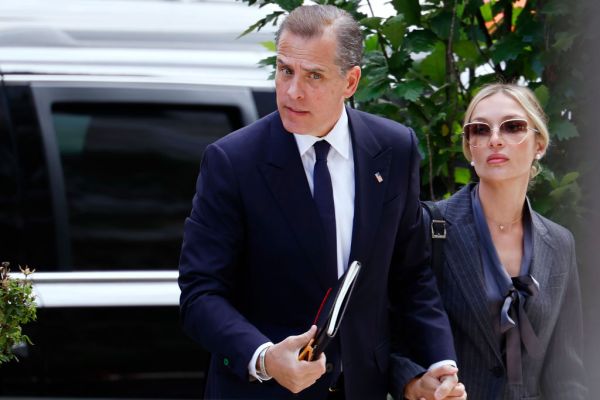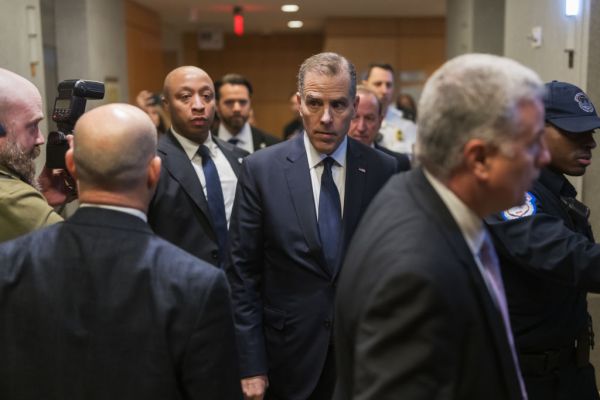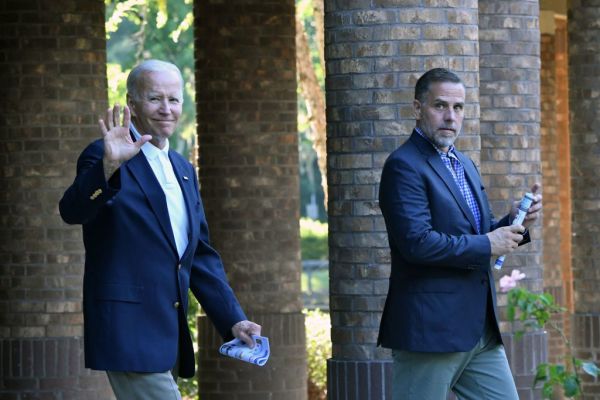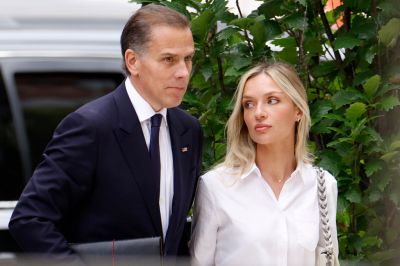Welcome to a(nother) special emergency edition of The Collision! Don’t worry, we’ll have our regularly scheduled issue out on Thursday, too.
On Tuesday, a jury of his peers found Hunter Biden, the last living son of President Joe Biden, guilty on three felony gun charges.
As we’ve noted in this newsletter before, the younger Biden was indicted in Delaware last year by the Department of Justice (DOJ) for lying about his drug use on a federal firearms application form, lying about his drug use to a federally licensed gun dealer, and for possession of a firearm while being a user or addict of illegal drugs. (He also faces a separate federal indictment on tax charges in California, with that trial set to begin in September.)
Although the maximum sentence for these three offenses is a total of 25 years in prison—a number you will no doubt hear a lot in the coming weeks—federal guidelines recommend a much shorter sentence. On the gun possession charge, for example, which is the most serious, the guidelines recommend 10 to 16 months in prison for someone with no criminal history. Federal judges are not bound by these recommendations, but the judge is required to consider them to calculate an appropriate sentence. And if she chooses to depart from the recommended sentence, she must publicly explain why. U.S. District Judge Maryellen Noreika, who presided over the trial, did not yet set a sentencing date.
That said, Hunter is likely to appeal the verdict. “We are naturally disappointed by today’s verdict,” said Abbe Lowell, Hunter’s attorney, in a statement. “We respect the jury process, and as we have done throughout this case, we will continue to vigorously pursue all the legal challenges available to Hunter.”
In a pretrial motion, he argued both that he was the victim of selective prosecution and that barring drug users from owning guns violates the Second Amendment. As we wrote last week when discussing Donald Trump’s avenues for appeal, however, selective prosecution claims rarely succeed.
Biden’s Second Amendment arguments are more interesting. Last year, the U.S. Court of Appeals for the 5th Circuit held that the same law Biden was convicted of violating was invalid as applied to an admitted marijuana user pulled over with a gun and a joint in his car, since law enforcement lacked evidence that he was high at the time. In doing so, the court also wrote that “our history and tradition may support some limits on an intoxicated person’s right to carry a weapon, but it does not justify disarming a sober citizen based exclusively on his past drug usage.”
The jury read its verdict just hours before President Joe Biden was set to speak at an event in Washington and encourage congressional lawmakers to pass more gun control legislation. In a statement Tuesday, the president said that he and his wife Jill “love our son.”
“As I also said last week, I will accept the outcome of this case and will continue to respect the judicial process as Hunter considers an appeal,” added Biden, who changed his plans to travel to Wilmington on Tuesday afternoon.
Biden said in an ABC News interview last week that he would not pardon Hunter if he were convicted—though anchor David Muir did not ask whether the president would consider commuting his son’s sentence. And if Biden were to lose the election in November, there likely wouldn’t be many political ramifications for an 82-year-old, lame-duck president who spares his son jail time as he leaves office.
The Trump campaign, meanwhile, released its own statement Tuesday afternoon that suggested the prosecution of Hunter had been a “distraction” for more serious crimes implicating his father. “This trial has been nothing more than a distraction from the real crimes of the Biden Crime Family, which has raked in tens of millions of dollars from China, Russia and Ukraine,” Trump press secretary Karoline Leavitt said. “Crooked Joe Biden’s reign over the Biden Family Criminal Empire is all coming to an end on November 5th, and never again will a Biden sell government access for personal profit.”
The genesis of both the gun and tax charges on Hunter Biden is a plea deal that was struck last year between his attorneys and the Justice Department but quickly fell apart. David Weiss, the DOJ attorney who was later named special counsel, initially charged the younger Biden with two misdemeanor tax evasion counts—plus a felony gun charge—in a deal that would have allowed Biden to face probation on the tax charges and pretrial diversion on the gun charge. But as we covered in our very first issue of The Collision, there was a dispute between the special counsel and Hunter’s lawyers in June 2023 about whether this deal would prevent Weiss and the DOJ from pursuing further charges. Eventually, however, the disagreement seemed resolved.
Until it wasn’t. Noreika paused the plea deal in order to figure out some inconsistencies, but it didn’t take long for the entire deal to collapse. Biden’s legal team insisted that their client receive immunity from future charges; the Justice Department said no. (A pair of IRS whistleblowers from earlier in the year suggested the DOJ had slow-walked its investigation into Hunter’s unpaid back taxes, and emails uncovered by the New York Times indicate Weiss “changed his mind” and began pushing to bring tax charges after the whistleblowers went public.)
By August 2023, Weiss had requested and was granted special counsel status by Attorney General Merrick Garland, and the plea deal was out the window. A month later, the DOJ indicted Biden on the felony gun charges, followed by the felony tax charges in December.








Please note that we at The Dispatch hold ourselves, our work, and our commenters to a higher standard than other places on the internet. We welcome comments that foster genuine debate or discussion—including comments critical of us or our work—but responses that include ad hominem attacks on fellow Dispatch members or are intended to stoke fear and anger may be moderated.
With your membership, you only have the ability to comment on The Morning Dispatch articles. Consider upgrading to join the conversation everywhere.